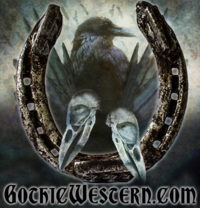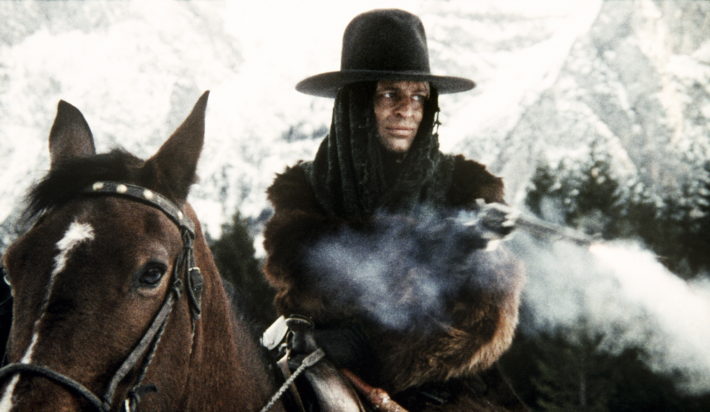The Great Silence (Italian: Il grande silenzio), also known by its alternative UK title The Big Silence, is a 1968 revisionist Spaghetti Western film directed and co-written by Sergio Corbucci. It is also one of filmmaker Quentin Tarantino’s big influences. Conceived by Corbucci as a politically-charged allegory inspired by the deaths of Che Guevara and Malcolm X, the film’s plot takes place in Utah prior to the Great Blizzard of 1899. It pits a mute gunslinger (Trintignant), fighting in the defence of a group of outlaws and a vengeful young widow (McGee), against a group of ruthless bounty killers led by “Loco” (Kinski) and the corrupt banker Henry Pollicut (Pistilli). Unlike most films of the genre, which were filmed in the Almería province of Spain to double for areas such as Texas and Mexico, The Great Silence was primarily filmed on location in the Italian Dolomites.
 Controversial for its bleak and dark tone, the film’s reputation grew, and it gained a cult following in the wake of its release. The Great Silence is now widely regarded by fans and authorities on Spaghetti Westerns as one of the greatest films of the genre, and is acknowledged as Corbucci’s masterpiece. Praise has gone to the acting, the utilization of snowbound landscapes, Ennio Morricone‘s score, and the film’s subversion of several conventions of the Western film genre.
Controversial for its bleak and dark tone, the film’s reputation grew, and it gained a cult following in the wake of its release. The Great Silence is now widely regarded by fans and authorities on Spaghetti Westerns as one of the greatest films of the genre, and is acknowledged as Corbucci’s masterpiece. Praise has gone to the acting, the utilization of snowbound landscapes, Ennio Morricone‘s score, and the film’s subversion of several conventions of the Western film genre.
 With its snowed-in setting, homicidal bounty hunters and original Ennio Morricone score, Quentin Tarantino’s The Hateful Eight bears a striking resemblance to The Great Silence (see video below). Indeed, Tarantino places The Great Silence at #14 on his top twenty favorite Spaghetti Westerns of all time. See the video below for more on this.
With its snowed-in setting, homicidal bounty hunters and original Ennio Morricone score, Quentin Tarantino’s The Hateful Eight bears a striking resemblance to The Great Silence (see video below). Indeed, Tarantino places The Great Silence at #14 on his top twenty favorite Spaghetti Westerns of all time. See the video below for more on this.
The Great Silence’s soundtrack was composed by Ennio Morricone, Corbucci’s frequent musical collaborator since Navajo Joe, and conducted by Bruno Nicolai. A melancholic, emotive score, Morricone personally viewed it as his best Spaghetti Western soundtrack aside from his compositions for Sergio Leone. One reviewer expressed that “the compositions of the film eschew “the soaring heroic melodies and pounding horse-hoof rhythms of the Leone films” and that the music closely resembles Morricone’s own 1970s horror film soundtracks.”
You can watch The Great Silence in its entirety HERE.



